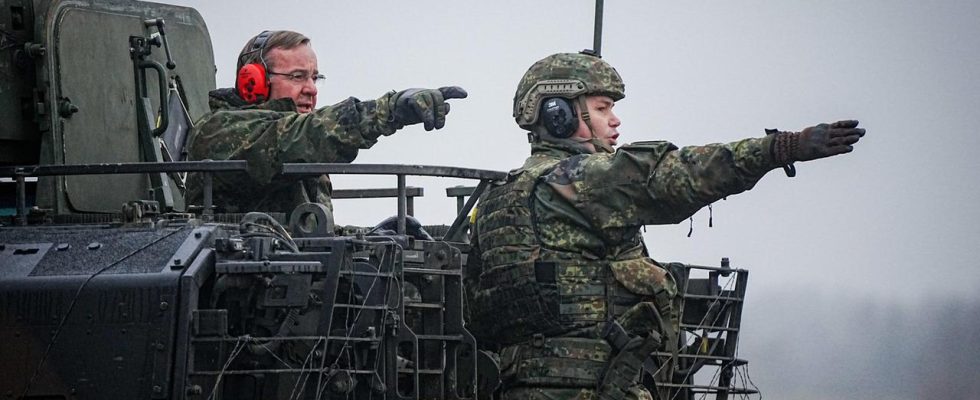Defense Minister Pistorius has already restructured his ministry in some areas. Now it’s the Bundeswehr’s turn. Today he is presenting his structural reform, which could make a difference.
Torben Arnold knows his way around the inner workings of the Bundeswehr. The officer was deployed abroad in Kosovo and Mali, also as a company commander. Arnold now researches security policy for the Science and Politics Foundation.
He is convinced that the Bundeswehr needs reform and that Defense Minister Boris Pistorius needs to address the sometimes encrusted structures. From his point of view, that would bring the troops forward. Arnold explains in an interview with the ARD capital studiothat the turning point for the soldiers is not yet tangible.
There is still a lack of equipment and it is simply taking time for the new material ordered to arrive. “But with a structural change, every soldier will experience firsthand that something can change. That the entire Bundeswehr will be turned inside out,” says Arnold.
“No bans on thinking”
Pistorius wants to change things on a large scale: immediately after taking office at the beginning of 2023, he publicly criticized the Bundeswehr’s complicated and sometimes opaque processes. Too much has stuck, too much has been left lying over the years.
In the fall, the SPD politician finally announced structural reform at the Bundeswehr conference in Berlin. And he made it clear: When restructuring the Bundeswehr, there should explicitly be no bans on thinking.
Entire organizational areas and existing commands should be questioned. The minister set up a project group that also includes the force’s highest-ranking soldier, Inspector General Carsten Breuer.
Central: the word “war-ready”
Now it’s about the results of this project group. The ARD a draft structural reform is available. What quickly becomes apparent: The word “war-ready” appears 17 times on the 34 pages – the term that Pistorius coined with a view to the Russian attack on Ukraine.
In fact, big steps are being planned: the draft talks about a “unified operational command” that is to be created. It could combine the previous two control points: the territorial command for domestic operations and the operational command for foreign operations.
Combined forces, clear responsibilities, more synergy. Officer Arnold speaks of leadership from a single source and a sensible idea.
Devaluation of the medical service?
A side effect: the medical service and the so-called armed forces base – logistics, military police and NBC defense – would lose their independence. They should be bundled under one command in a so-called support area.
This has already sparked protests from health care representatives. Medical associations warn that the good reputation of the Bundeswehr’s medical service could suffer. They also fear that the Bundeswehr could find it more difficult to find good medical specialists in the future.
Fundamentally, structural reform is about pooling forces. Because the Bundeswehr is far from its planned strength. By 2031 it is expected to have 203,000 soldiers; at the moment there are just 181,000. So far, the Bundeswehr has not been able to recruit enough new personnel. The idea is therefore to plan the existing forces more specifically: to get them out of bureaucratic structures and deploy them where there is an acute shortage.
“Parallels to the old Bundeswehr”
Another goal is to reorient the Bundeswehr more towards national and alliance defense and less towards foreign missions. Officer and scientist Arnold sees parallels to the old Bundeswehr as it was set up before reunification.
In some areas, the structure from before 1990 is being restored because the branches of the armed forces are being given more prominence. But Arnold doesn’t see any regression. The image of war has changed completely compared to the 1970s and 1980s. “In a defense situation, the forces would be subordinated to NATO and there they would be led from a single source,” explains Arnold.
“The work is just starting now”
It is unclear how many of the suggestions from the draft paper Pistorius actually adopts. But his central demands are well known: leaner hierarchies in the Bundeswehr and thus faster decisions. Anything that takes concrete steps in this direction should have a good chance of being implemented.
However, journalist and military expert Thomas Wiegold warns against setting too high expectations when it comes to speed. Now only the new general structure of the Bundeswehr is in place. It still needs to be filled with life, says Wiegold in an interview with SWR. “The work is just starting now.”
Oliver Neuroth, ARD Berlin, tagesschau, April 4th, 2024 6:23 a.m

